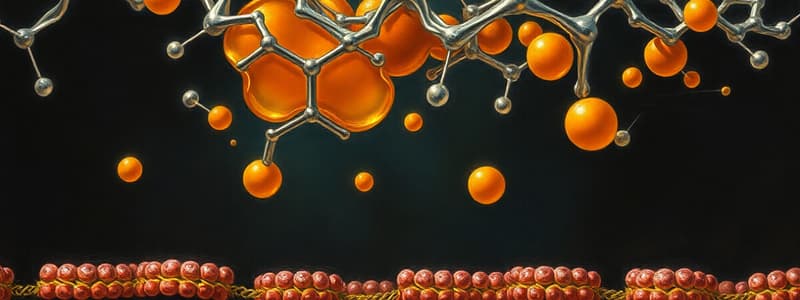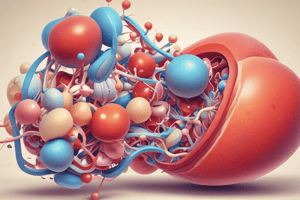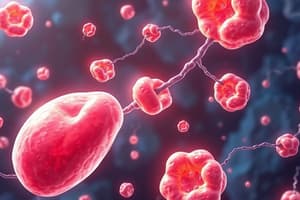Podcast
Questions and Answers
What is the term for the cycle through which bile acids are reused by the liver?
What is the term for the cycle through which bile acids are reused by the liver?
What condition results from an imbalance of cholesterol, phospholipids, and bile salts?
What condition results from an imbalance of cholesterol, phospholipids, and bile salts?
What is the primary consequence of liver disease on bile acid metabolism?
What is the primary consequence of liver disease on bile acid metabolism?
Which of the following is NOT a type of bile salt mentioned?
Which of the following is NOT a type of bile salt mentioned?
Signup and view all the answers
What is the main source of acetyl CoA in the context of bile acid synthesis?
What is the main source of acetyl CoA in the context of bile acid synthesis?
Signup and view all the answers
What is the primary source of cholesterol synthesis in the body?
What is the primary source of cholesterol synthesis in the body?
Signup and view all the answers
Which enzyme is considered the key regulatory point in cholesterol biosynthesis?
Which enzyme is considered the key regulatory point in cholesterol biosynthesis?
Signup and view all the answers
How can cholesterol levels in the body be decreased?
How can cholesterol levels in the body be decreased?
Signup and view all the answers
What is the stage in cholesterol biosynthesis where mevalonate is synthesized from acetyl CoA?
What is the stage in cholesterol biosynthesis where mevalonate is synthesized from acetyl CoA?
Signup and view all the answers
What is the function of the citrate transport system in cholesterol biosynthesis?
What is the function of the citrate transport system in cholesterol biosynthesis?
Signup and view all the answers
Which of the following statements is true about HMG CoA reductase?
Which of the following statements is true about HMG CoA reductase?
Signup and view all the answers
What is the activated 5-carbon unit involved in cholesterol synthesis?
What is the activated 5-carbon unit involved in cholesterol synthesis?
Signup and view all the answers
Which of these options does NOT contribute to decreasing cholesterol levels?
Which of these options does NOT contribute to decreasing cholesterol levels?
Signup and view all the answers
What symbol indicates the presence of a double bond in fatty acids?
What symbol indicates the presence of a double bond in fatty acids?
Signup and view all the answers
What is the primary role of cholesterol in cell membranes?
What is the primary role of cholesterol in cell membranes?
Signup and view all the answers
Which of the following statements about Vitamin D3 is correct?
Which of the following statements about Vitamin D3 is correct?
Signup and view all the answers
What are the steroid hormones synthesized from cholesterol?
What are the steroid hormones synthesized from cholesterol?
Signup and view all the answers
Which enzyme catalyzes the rate-limiting step in bile acid synthesis?
Which enzyme catalyzes the rate-limiting step in bile acid synthesis?
Signup and view all the answers
What is the absorption efficiency of plant sterols in the human digestive system?
What is the absorption efficiency of plant sterols in the human digestive system?
Signup and view all the answers
How much cholesterol is typically absorbed from a western diet?
How much cholesterol is typically absorbed from a western diet?
Signup and view all the answers
Which of the following best describes the formation of Vitamin D3?
Which of the following best describes the formation of Vitamin D3?
Signup and view all the answers
What happens to the mRNA of HMG CoA reductase when cholesterol levels are high?
What happens to the mRNA of HMG CoA reductase when cholesterol levels are high?
Signup and view all the answers
Which signal activates AMP-activated protein kinase (AMPK)?
Which signal activates AMP-activated protein kinase (AMPK)?
Signup and view all the answers
What is the result of glucagon activation in relation to cholesterol synthesis?
What is the result of glucagon activation in relation to cholesterol synthesis?
Signup and view all the answers
How does insulin affect HMG CoA reductase activity?
How does insulin affect HMG CoA reductase activity?
Signup and view all the answers
What is the role of SREBP:SCAP in cholesterol regulation?
What is the role of SREBP:SCAP in cholesterol regulation?
Signup and view all the answers
What effect does high AMP concentration have on HMG CoA reductase?
What effect does high AMP concentration have on HMG CoA reductase?
Signup and view all the answers
How does cholesterol serve as a feedback inhibitor in its biosynthesis?
How does cholesterol serve as a feedback inhibitor in its biosynthesis?
Signup and view all the answers
Which hormone is associated with increasing cholesterol synthesis?
Which hormone is associated with increasing cholesterol synthesis?
Signup and view all the answers
Which of the following statements about the synthesis of bile salts is accurate?
Which of the following statements about the synthesis of bile salts is accurate?
Signup and view all the answers
What mechanisms do bile salts use to aid in lipid digestion?
What mechanisms do bile salts use to aid in lipid digestion?
Signup and view all the answers
What occurs to bile salts after they are secreted into the intestine?
What occurs to bile salts after they are secreted into the intestine?
Signup and view all the answers
Which of the following statements is true regarding conjugated bile salts?
Which of the following statements is true regarding conjugated bile salts?
Signup and view all the answers
Which process is the primary way cholesterol is eliminated from the body?
Which process is the primary way cholesterol is eliminated from the body?
Signup and view all the answers
What is the effect of hydroxylation and carboxylation on bile salts?
What is the effect of hydroxylation and carboxylation on bile salts?
Signup and view all the answers
What can lead to the formation of secondary bile acids?
What can lead to the formation of secondary bile acids?
Signup and view all the answers
Which of the following substances is NOT part of the composition of bile?
Which of the following substances is NOT part of the composition of bile?
Signup and view all the answers
Study Notes
Cholesterol: Structure and Function
- Double bonds in a molecule's structure are indicated by a ∆ symbol followed by a superscript denoting the carbon atom where the double bond is located.
- Cholesterol is a vital component of mammalian plasma membranes and myelin, making up approximately 25% of their total lipid content.
- Cholesterol is present in organelle membranes at much lower concentrations.
- Cholesterol acts as a buffer, influencing the fluidity of cell membranes.
Vitamin D Synthesis and Calcium Metabolism
- Vitamin D3 (vit.D3) is transformed into a hormone that enhances intestinal calcium absorption and bone demineralization.
- Vitamin D3 is synthesized endogenously from cholesterol in the skin upon exposure to UV radiation.
- 1,25-Dihydroxycholecalciferol represents the active form of vitamin D3.
Steroid Hormone Synthesis
- Cholesterol serves as the precursor for various steroid hormones, including sex steroids, glucocorticoids, and mineralocorticoids.
- Steroid hormone synthesis involves shortening the hydrocarbon chain and oxidizing the steroid nucleus.
- Progesterone, testosterone, estradiol, cortisol, and others are examples of steroid hormones derived from cholesterol.
Bile Acids/Salts Synthesis
- Bile acids are the most significant products of cholesterol metabolism.
- 7-hydroxylase catalyzes the rate-limiting step in bile acid synthesis.
- Primary bile acids are synthesized directly from cholesterol in the liver, with cholic acid and chenodeoxycholic acid being prominent examples.
- Deoxycholic acid and lithocholic acid, formed in the intestine from primary bile acids by intestinal bacterial enzymes, are categorized as secondary bile acids.
- Bile acids are conjugated to glycine or taurine via peptide bonds through the carbon 24 carboxylate, forming conjugated bile salts.
Plant Sterols
- Plants lack significant amounts of cholesterol but contain other sterols like stigmasterol, sitosterol, and sitostanol.
- Plant sterols are not readily absorbed by the human digestive system, impacting cholesterol absorption.
Cholesterol Balance
- Western diets typically contain 400-600mg/day of cholesterol, with roughly half being absorbed.
- The human body synthesizes approximately 800mg/day of cholesterol.
- Cholesterol production is balanced mainly by the excretion of bile acids, ranging from 1000-1100mg/day.
- Strategies to decrease cholesterol levels include reducing dietary cholesterol uptake, decreasing cholesterol synthesis, and increasing bile acid excretion.
Cholesterol Biosynthesis
- Most tissues, particularly the liver (primary source), adrenals, gonads, intestines, and placenta, can synthesize cholesterol.
- Cholesterol biosynthesis is subject to metabolic regulation.
- The biosynthesis of cholesterol involves stages 1-4.
Stage 1: Synthesis of Mevalonate from Acetyl CoA
- Cholesterol synthesis takes place in the cytoplasm.
- The citrate transport system facilitates the movement of excess acetyl CoA from the mitochondrial matrix to the cytoplasm.
- Stage 1 involves the synthesis of mevalonate (6C) from acetyl CoA (2C).
- HMG CoA reductase serves as the key regulatory point in cholesterol biosynthesis, catalyzing the reduction of HMG CoA to mevalonate.
Stage 2-4: Synthesis of Isopentenyl Pyrophosphate (IPP)
- Stage 2-4 involves the synthesis of isopentenyl pyrophosphate (IPP), a critical intermediate in cholesterol synthesis.
- IPP represents the activated 5-carbon unit.
Regulation of Cholesterol Biosynthesis
- Cholesterol biosynthesis regulation occurs through proteolysis, phosphorylation, and hormonal mechanisms.
Proteolysis:
- Degradation of HMG CoA reductase enzyme is accelerated by high cholesterol levels.
- When cholesterol levels are abundant, mRNA of HMG CoA reductase undergoes degradation.
Phosphorylation:
- AMP-activated protein kinase (AMPK) plays a role in regulating cholesterol biosynthesis via phosphorylation and dephosphorylation of HMG CoA reductase.
- High AMP levels activate AMPK, leading to phosphorylation of HMG CoA reductase, which lowers cholesterol synthesis.
- Insulin activates protein phosphatase, resulting in dephosphorylation, boosting cholesterol synthesis.
Hormonal Regulation:
- Mobilizing hormones, like glucagon, tend to decrease cholesterol synthesis.
- Storage hormones, like insulin, increase cholesterol synthesis.
- Glucagon activates a kinase (PKA, AMPK), while insulin activates a phosphatase, impacting cholesterol biosynthesis.
Summary of Cholesterol Biosynthesis Regulation
- HMG CoA reductase is the key enzyme regulating cholesterol biosynthesis.
- Cholesterol acts as a feedback inhibitor of HMG CoA reductase synthesis through a complex transcriptional regulatory mechanism involving SREBP:SCAP.
- AMP levels control HMG CoA reductase activity via reversible phosphorylation, with the phosphorylated enzyme (high AMP) being less active than the unphosphorylated enzyme.
- Statins are cholesterol-lowering drugs that target HMG CoA reductase.
Bile Salts Metabolism
- Bile salts are detergents derived from cholesterol.
- Bile salts emulsify dietary lipids, enhancing their digestion.
- Bile is comprised of water, phosphatidylcholine (lecithin), bile salts, and cholesterol.
- Bile salts are synthesized in the liver and stored in the gallbladder.
- Bile salts undergo reabsorption in the GI tract for re-circulation back to the liver (enterohepatic circulation).
- Daily excretion of bile salts in feces is a significant mechanism for cholesterol elimination from the body.
- Bile salt deficiency can contribute to cholelithiasis (gallstone disease).
Key Concepts in Cholesterol Metabolism
- Understand the terms: steroid, sterol, steroid nucleus, plant sterols, bile acids/bile salts, primary bile salts, secondary bile salts, conjugated bile salts, and enterohepatic circulation.
- Recognize the functions of cholesterol and bile acids.
- Familiarize yourself with the rate-limiting and committed steps in cholesterol biosynthesis and associated key enzymes.
- Understand the key regulatory mechanisms governing cholesterol biosynthesis.
- Know the clinical correlations related to disease symptoms, biochemical basis, and treatment (e.g., Cholelithiasis).
Studying That Suits You
Use AI to generate personalized quizzes and flashcards to suit your learning preferences.
Related Documents
Description
Test your knowledge on the structure and function of cholesterol, its role in vitamin D synthesis, and its involvement in calcium metabolism. Additionally, explore the importance of cholesterol as a precursor for steroid hormone synthesis. This quiz covers key concepts essential for understanding lipid biology.



